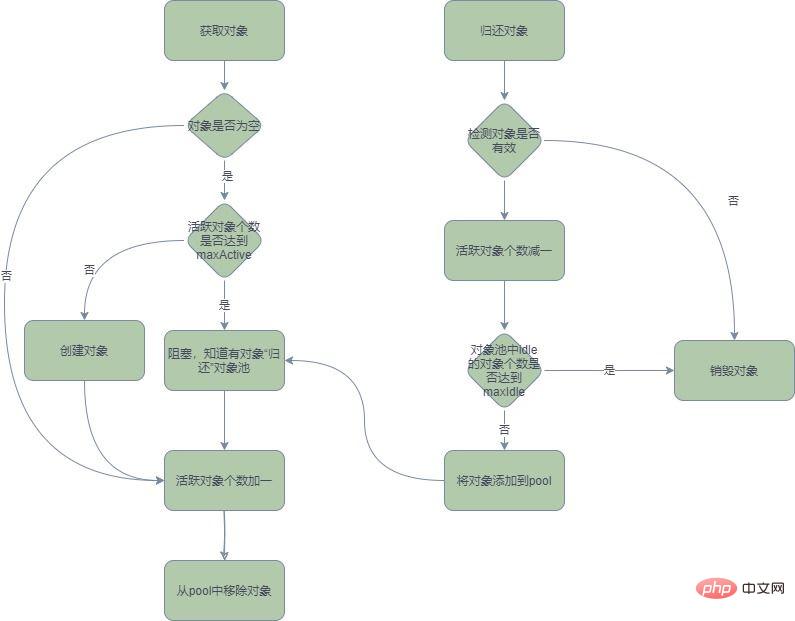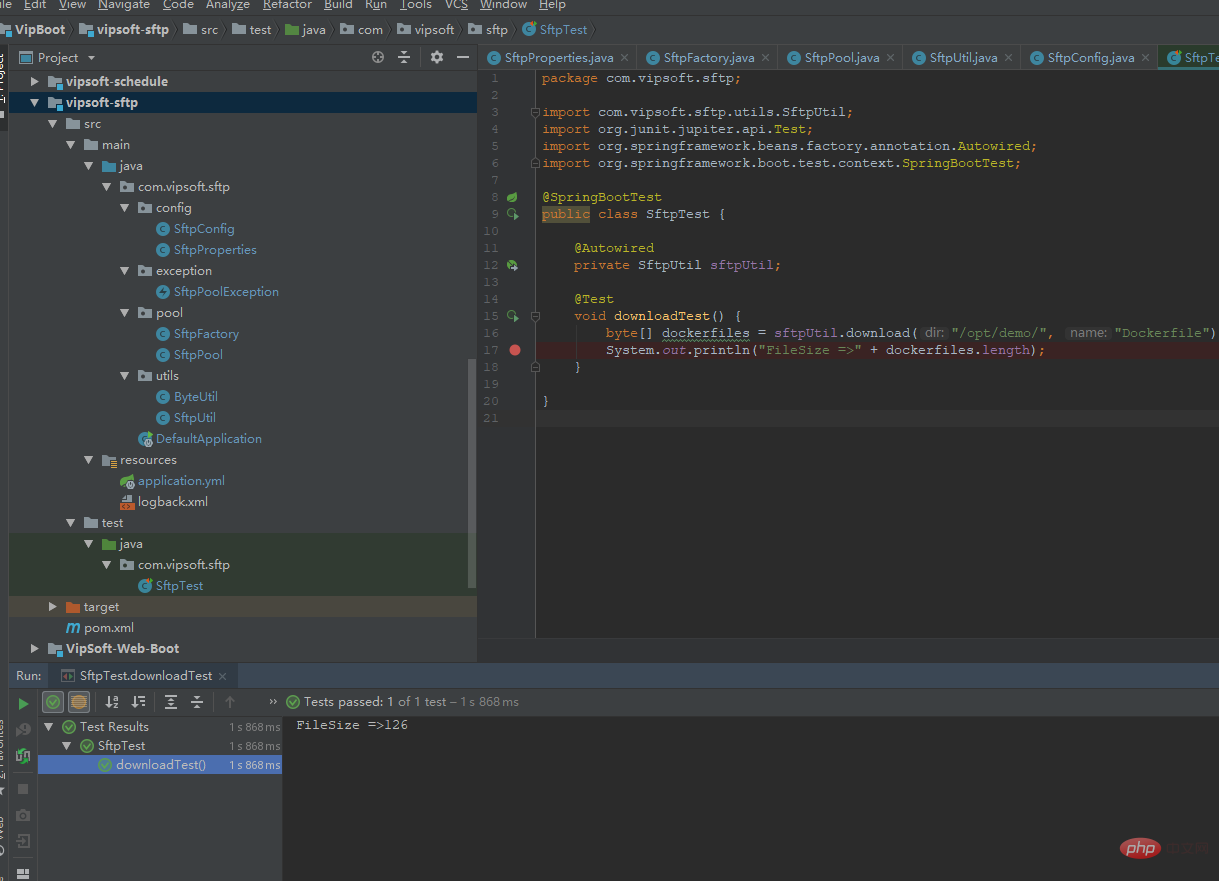Heim >Java >javaLernprogramm >So verwenden Sie die Java GenericObjectPool-Objektpooling-Technologie
So verwenden Sie die Java GenericObjectPool-Objektpooling-Technologie
- 王林nach vorne
- 2023-05-06 15:07:081345Durchsuche
Java BasePooledObjectFactory-Objektpooling-Technologie
Wenn die Erstellung und Zerstörung eines Objekts sehr zeitaufwändig ist, erstellen und zerstören wir es normalerweise nicht häufig, sondern ziehen eine Wiederverwendung in Betracht. Eine Methode zur Wiederverwendung von Objekten ist das Objekt-Pooling. Bei der nächsten Verwendung können Sie die erstellten Objekte direkt im Pool verwenden und weiter verwenden des Poolings.
Apache Commons Pool ist ein Objektpool-Framework, das einen vollständigen Satz von APIs für die Implementierung von Objektpooling bereitstellt. Es bietet drei Objektpools: GenericKeyedObjectPool, SoftReferenceObjectPool und GenericObjectPool ist unser am häufigsten verwendeter Objektpool und seine interne Implementierung ist auch die komplexeste.
GenericObjectPool
GenericObjectPool ist ein allgemeines Objektpool-Framework, mit dem wir einen robusten Objektpool implementieren können. Das UML-Diagramm lautet wie folgt:

GenericObjectPool implementiert die ObjectPool-Schnittstelle und ObjectPool ist die Kernschnittstelle von Objektpool. Es definiert das Verhalten, das ein Objektpool implementieren soll.
public interface ObjectPool<T> extends Closeable {
/**
* 从池中借走到一个对象
*/
T borrowObject() throws Exception, NoSuchElementException, IllegalStateException;
/**
* 把对象归还给对象池
*/
void returnObject(T var1) throws Exception;
/**
* 验证对象的有效性
*/
void invalidateObject(T var1) throws Exception;
/**
* 往池中添加一个对象
*/
void addObject() throws Exception, IllegalStateException, UnsupportedOperationException;
/**
* 返回对象池中有多少对象是空闲的,也就是能够被借走的对象的数量。
*/
int getNumIdle();
/**
* 返回对象池中有对象对象是活跃的,也就是已经被借走的,在使用中的对象的数量。
*/
int getNumActive();
/**
* 清理对象池。注意是清理不是清空,该方法要求的是,清理所有空闲对象,释放相关资源。
*/
void clear() throws Exception, UnsupportedOperationException;
/**
* 关闭对象池。这个方法可以达到清空的效果,清理所有对象以及相关资源。
*/
void close();
}BasePooledObjectFactory
Java BasePooledObjectFactory-Objektpooling-Technologie
Mit GenericObjectPool muss lediglich eine Objektfabrikklasse erstellt, BasePooledObjectFactory geerbt und deren create( ) und <code>destroyObject(). GenericObjectPool只需要创建一个对象工厂类,继承BasePooledObjectFactory并重写它的create()和destroyObject()。
如下文中的:SftpPool.java
public interface PooledObjectFactory<T> {
/**
* 创建一个可由池提供服务的实例,并将其封装在由池管理的PooledObject中。
*/
PooledObject<T> makeObject() throws Exception;
/**
* 销毁池不再需要的实例
*/
void destroyObject(PooledObject<T> var1) throws Exception;
/**
* 确保实例可以安全地由池返回
*/
boolean validateObject(PooledObject<T> var1);
/**
* 重新初始化池返回的实例
*/
void activateObject(PooledObject<T> var1) throws Exception;
/**
* 取消初始化要返回到空闲对象池的实例
*/
void passivateObject(PooledObject<T> var1) throws Exception;
}配置类GenericObjectPoolConfig
GenericObjectPoolConfig是封装GenericObject池配置的简单“结构”,此类不是线程安全的;它仅用于提供创建池时使用的属性。大多数情况,可以使用GenericObjectPoolConfigWie im Folgenden: SftpPool.java
<dependency>
<groupId>org.apache.commons</groupId>
<artifactId>commons-pool2</artifactId>
<version>2.7.0</version>
</dependency>
<!-- https://mvnrepository.com/artifact/com.jcraft/jsch -->
<dependency>
<groupId>com.jcraft</groupId>
<artifactId>jsch</artifactId>
<version>0.1.55</version>
</dependency>Konfigurationsklasse GenericObjectPoolConfig
Arbeitsprinzip des Prozesses
- Konstruktormethode
Wenn wir die Konstruktormethode ausführen, besteht die Hauptaufgabe darin, einen Container vom Typ LinkedList zum Speichern von Objekten zu erstellen, der im konzeptionellen Sinne ein „Pool“ ist
- Holen Sie es sich von Das Objektpool-Objekt
Das Abrufen von Objekten im Pool erfolgt über den Befehl „borgObject()“. Einfach ausgedrückt besteht es darin, ein Objekt aus der LinkedList abzurufen Factory-Klasse, der erste Parameter im Konstruktor. Rufen Sie nach dem Abrufen des Objekts die Methode „validateObject“ auf, um festzustellen, ob das Objekt verfügbar ist. Verringern Sie den LinkedList-Container um eins. Geben Sie das Objekt an den Thread-Pool zurück. Rufen Sie einfach die Methode „validateObject“ auf, um festzustellen, ob das Objekt verfügbar ist. Der LinkedList-Container wird um eins erhöht Wenn es nicht verfügbar ist, nennen Sie es die Methode destroyObject, um es zu zerstören
GenericObjectPoolConfig ist eine einfache „Struktur“, die den GenericObject-Pool kapselt Konfiguration Diese Klasse ist nicht threadsicher; sie wird nur zum Bereitstellen von Eigenschaften verwendet, die beim Erstellen des Pools verwendet werden. In den meisten Fällen können Sie die von GenericObjectPoolConfig bereitgestellten Standardparameter verwenden, um den täglichen Bedarf zu decken. 
<?xml version="1.0" encoding="UTF-8"?>
<project xmlns="http://maven.apache.org/POM/4.0.0"
xmlns:xsi="http://www.w3.org/2001/XMLSchema-instance"
xsi:schemaLocation="http://maven.apache.org/POM/4.0.0 http://maven.apache.org/xsd/maven-4.0.0.xsd">
<parent>
<artifactId>vipsoft-parent</artifactId>
<groupId>com.vipsoft.boot</groupId>
<version>1.0-SNAPSHOT</version>
</parent>
<modelVersion>4.0.0</modelVersion>
<artifactId>vipsoft-sftp</artifactId>
<version>1.0-SNAPSHOT</version>
<dependencies>
<dependency>
<groupId>org.apache.commons</groupId>
<artifactId>commons-pool2</artifactId>
<version>2.7.0</version>
</dependency>
<!-- https://mvnrepository.com/artifact/com.jcraft/jsch -->
<dependency>
<groupId>com.jcraft</groupId>
<artifactId>jsch</artifactId>
<version>0.1.55</version>
</dependency>
<dependency>
<groupId>org.eclipse.paho</groupId>
<artifactId>org.eclipse.paho.client.mqttv3</artifactId>
<version>1.2.5</version>
</dependency>
<dependency>
<groupId>cn.hutool</groupId>
<artifactId>hutool-all</artifactId>
<version>5.3.6</version>
</dependency>
<dependency>
<groupId>org.springframework.boot</groupId>
<artifactId>spring-boot-starter-web</artifactId>
</dependency>
<dependency>
<groupId>org.springframework.boot</groupId>
<artifactId>spring-boot-starter-actuator</artifactId>
</dependency>
<dependency>
<groupId>org.springframework.boot</groupId>
<artifactId>spring-boot-starter-test</artifactId>
<scope>test</scope>
<exclusions>
<exclusion>
<groupId>org.junit.vintage</groupId>
<artifactId>junit-vintage-engine</artifactId>
</exclusion>
</exclusions>
</dependency>
</dependencies>
<build>
<plugins>
<plugin>
<groupId>org.springframework.boot</groupId>
<artifactId>spring-boot-maven-plugin</artifactId>
</plugin>
</plugins>
</build>
</project>server:
port: 8088
application:
name: sftp Demo
sftp:
host: 172.16.3.88 # 服务器ip
port: 22 # ssh端口
username: root # 用户名
password: root # 密码
# 连接池参数
pool:
max-total: 10
max-idle: 10
min-idle: 5
application.yamlpackage com.vipsoft.sftp.exception;
/**
* sftp连接池异常
*/
public class SftpPoolException extends RuntimeException {
private static final long serialVersionUID = 1L;
/**
* Constructs a new runtime exception with {@code null} as its
* detail message. The cause is not initialized, and may subsequently be
* initialized by a call to {@link #initCause}.
*/
public SftpPoolException() {
}
/**
* Constructs a new runtime exception with the specified detail message.
* The cause is not initialized, and may subsequently be initialized by a
* call to {@link #initCause}.
*
* @param message the detail message. The detail message is saved for
* later retrieval by the {@link #getMessage()} method.
*/
public SftpPoolException(String message) {
super(message);
}
/**
* Constructs a new runtime exception with the specified detail message and
* cause. <p>Note that the detail message associated with
* {@code cause} is <i>not</i> automatically incorporated in
* this runtime exception's detail message.
*
* @param message the detail message (which is saved for later retrieval
* by the {@link #getMessage()} method).
* @param cause the cause (which is saved for later retrieval by the
* {@link #getCause()} method). (A <tt>null</tt> value is
* permitted, and indicates that the cause is nonexistent or
* unknown.)
* @since 1.4
*/
public SftpPoolException(String message, Throwable cause) {
super(message, cause);
}
/**
* Constructs a new runtime exception with the specified cause and a
* detail message of <tt>(cause==null ? null : cause.toString())</tt>
* (which typically contains the class and detail message of
* <tt>cause</tt>). This constructor is useful for runtime exceptions
* that are little more than wrappers for other throwables.
*
* @param cause the cause (which is saved for later retrieval by the
* {@link #getCause()} method). (A <tt>null</tt> value is
* permitted, and indicates that the cause is nonexistent or
* unknown.)
* @since 1.4
*/
public SftpPoolException(Throwable cause) {
super(cause);
}
/**
* Constructs a new runtime exception with the specified detail
* message, cause, suppression enabled or disabled, and writable
* stack trace enabled or disabled.
*
* @param message the detail message.
* @param cause the cause. (A {@code null} value is permitted,
* and indicates that the cause is nonexistent or unknown.)
* @param enableSuppression whether or not suppression is enabled
* or disabled
* @param writableStackTrace whether or not the stack trace should
* be writable
* @since 1.7
*/
public SftpPoolException(String message, Throwable cause, boolean enableSuppression, boolean writableStackTrace) {
super(message, cause, enableSuppression, writableStackTrace);
}
}SftpPoolException.javapackage com.vipsoft.sftp.config;
import com.vipsoft.sftp.pool.SftpFactory;
import com.vipsoft.sftp.pool.SftpPool;
import com.vipsoft.sftp.utils.SftpUtil;
import org.springframework.boot.context.properties.EnableConfigurationProperties;
import org.springframework.context.annotation.Bean;
import org.springframework.context.annotation.Configuration;
@Configuration
@EnableConfigurationProperties(SftpProperties.class)
public class SftpConfig {
// 工厂
@Bean
public SftpFactory sftpFactory(SftpProperties properties) {
return new SftpFactory(properties);
}
// 连接池
@Bean
public SftpPool sftpPool(SftpFactory sftpFactory) {
return new SftpPool(sftpFactory);
}
// 辅助类
@Bean
public SftpUtil sftpUtil(SftpPool sftpPool) {
return new SftpUtil(sftpPool);
}
}configSftpConfig.java package com.vipsoft.sftp.config;
import com.jcraft.jsch.ChannelSftp;
import org.apache.commons.pool2.impl.GenericObjectPoolConfig;
import org.springframework.boot.context.properties.ConfigurationProperties;
@ConfigurationProperties(prefix = "sftp")
public class SftpProperties {
private String host;
private int port = 22;
private String username = "root";
private String password = "root";
private Pool pool = new Pool();
public String getHost() {
return host;
}
public void setHost(String host) {
this.host = host;
}
public int getPort() {
return port;
}
public void setPort(int port) {
this.port = port;
}
public String getUsername() {
return username;
}
public void setUsername(String username) {
this.username = username;
}
public String getPassword() {
return password;
}
public void setPassword(String password) {
this.password = password;
}
public Pool getPool() {
return pool;
}
public void setPool(Pool pool) {
this.pool = pool;
}
public static class Pool extends GenericObjectPoolConfig<ChannelSftp> {
private int maxTotal = DEFAULT_MAX_TOTAL;
private int maxIdle = DEFAULT_MAX_IDLE;
private int minIdle = DEFAULT_MIN_IDLE;
public Pool() {
super();
}
@Override
public int getMaxTotal() {
return maxTotal;
}
@Override
public void setMaxTotal(int maxTotal) {
this.maxTotal = maxTotal;
}
@Override
public int getMaxIdle() {
return maxIdle;
}
@Override
public void setMaxIdle(int maxIdle) {
this.maxIdle = maxIdle;
}
@Override
public int getMinIdle() {
return minIdle;
}
@Override
public void setMinIdle(int minIdle) {
this.minIdle = minIdle;
}
}
} SftpProperties.javapackage com.vipsoft.sftp.pool;
import com.jcraft.jsch.ChannelSftp;
import com.jcraft.jsch.JSch;
import com.jcraft.jsch.JSchException;
import com.jcraft.jsch.Session;
import com.vipsoft.sftp.config.SftpProperties;
import com.vipsoft.sftp.exception.SftpPoolException;
import org.apache.commons.pool2.BasePooledObjectFactory;
import org.apache.commons.pool2.PooledObject;
import org.apache.commons.pool2.impl.DefaultPooledObject;
import org.slf4j.Logger;
import org.slf4j.LoggerFactory;
import java.util.Properties;
public class SftpFactory extends BasePooledObjectFactory<ChannelSftp> {
private final Logger logger = LoggerFactory.getLogger(this.getClass());
private SftpProperties properties;
public SftpProperties getProperties() {
return properties;
}
public void setProperties(SftpProperties properties) {
this.properties = properties;
}
public SftpFactory(SftpProperties properties) {
this.properties = properties;
}
@Override
public ChannelSftp create() {
try {
JSch jsch = new JSch();
Session sshSession = jsch.getSession(properties.getUsername(), properties.getHost(), properties.getPort());
sshSession.setPassword(properties.getPassword());
Properties sshConfig = new Properties();
sshConfig.put("StrictHostKeyChecking", "no");
sshSession.setConfig(sshConfig);
sshSession.connect();
ChannelSftp channel = (ChannelSftp) sshSession.openChannel("sftp");
channel.connect();
return channel;
} catch (JSchException e) {
throw new SftpPoolException("连接sfpt失败", e);
}
}
@Override
public PooledObject<ChannelSftp> wrap(ChannelSftp channelSftp) {
return new DefaultPooledObject<>(channelSftp);
}
// 销毁对象
@Override
public void destroyObject(PooledObject<ChannelSftp> p) {
ChannelSftp channelSftp = p.getObject();
channelSftp.disconnect();
}
}PoolSftpFactory.javapackage com.vipsoft.sftp.pool;
import com.jcraft.jsch.ChannelSftp;
import org.apache.commons.pool2.impl.GenericObjectPool;
public class SftpPool<T> extends GenericObjectPool<ChannelSftp> {
public SftpPool(SftpFactory factory) {
super(factory,factory.getProperties().getPool());
}
/**
* 获取一个sftp连接对象
* @return sftp连接对象
*/
@Override
public ChannelSftp borrowObject() throws Exception {
return super.borrowObject();
}
/**
* 归还一个sftp连接对象
* @param channelSftp sftp连接对象
*/
@Override
public void returnObject(ChannelSftp channelSftp) {
if (channelSftp!=null) {
super.returnObject(channelSftp);
}
}
}SftpPool.javapackage com.vipsoft.sftp.utils;
import com.jcraft.jsch.ChannelSftp;
import com.jcraft.jsch.SftpException;
import com.vipsoft.sftp.exception.SftpPoolException;
import com.vipsoft.sftp.pool.SftpPool;
import java.io.InputStream;
public class SftpUtil {
private SftpPool pool;
public SftpUtil(SftpPool pool) {
this.pool = pool;
}
/**
* 下载文件
*
* @param dir 远程目录
* @param name 远程文件名
* @return 文件字节数组
*/
public byte[] download(String dir, String name) {
ChannelSftp sftp = null;
try {
sftp = pool.borrowObject();
sftp.cd(dir);
InputStream in = sftp.get(name);
return ByteUtil.inputStreamToByteArray(in);
} catch (Exception e) {
throw new SftpPoolException("sftp下载文件出错", e);
} finally {
pool.returnObject(sftp);
}
}
/**
* 上传文件
*
* @param dir 远程目录
* @param name 远程文件名
* @param in 输入流
*/
public void upload(String dir, String name, InputStream in) {
ChannelSftp sftp = null;
try {
sftp = pool.borrowObject();
mkdirs(sftp, dir);
sftp.cd(dir);
sftp.put(in, name);
} catch (Exception e) {
throw new SftpPoolException("sftp上传文件出错", e);
} finally {
pool.returnObject(sftp);
}
}
/**
* 删除文件
*
* @param dir 远程目录
* @param name 远程文件名
*/
public void delete(String dir, String name) {
ChannelSftp sftp = null;
try {
sftp = pool.borrowObject();
sftp.cd(dir);
sftp.rm(name);
} catch (Exception e) {
throw new SftpPoolException("sftp删除文件出错", e);
} finally {
pool.returnObject(sftp);
}
}
/**
* 递归创建多级目录
*
* @param dir 多级目录
*/
private void mkdirs(ChannelSftp sftp, String dir) {
String[] folders = dir.split("/");
try {
sftp.cd("/");
for (String folder : folders) {
if (folder.length() > 0) {
try {
sftp.cd(folder);
} catch (Exception e) {
sftp.mkdir(folder);
sftp.cd(folder);
}
}
}
} catch (SftpException e) {
throw new SftpPoolException("sftp创建目录出错", e);
}
}
}UtilsByteUtil.javapackage com.vipsoft.sftp;
import com.vipsoft.sftp.utils.SftpUtil;
import org.junit.jupiter.api.Test;
import org.springframework.beans.factory.annotation.Autowired;
import org.springframework.boot.test.context.SpringBootTest;
@SpringBootTest
public class SftpTest {
@Autowired
private SftpUtil sftpUtil;
@Test
void downloadTest() {
byte[] dockerfiles = sftpUtil.download("/opt/demo/", "Dockerfile");
System.out.println("FileSize =>" + dockerfiles.length);
}
}TestSft pTest.javarr reee

Das obige ist der detaillierte Inhalt vonSo verwenden Sie die Java GenericObjectPool-Objektpooling-Technologie. Für weitere Informationen folgen Sie bitte anderen verwandten Artikeln auf der PHP chinesischen Website!
In Verbindung stehende Artikel
Mehr sehen- Wie greife ich über die Aktivität auf ViewPager-Fragmentmethoden zu?
- Wie verpacke ich bestimmte Module in einem Maven-Projekt mit mehreren Modulen?
- Warum kann ich keine Bilder in mein exportiertes JAR aus Eclipse laden?
- Wie erkennt man die Ausrichtung im Quer- oder Hochformat in Android?
- Wie kann Java verwendet werden, um ein Bild in die Form eines Textes zu schneiden?

